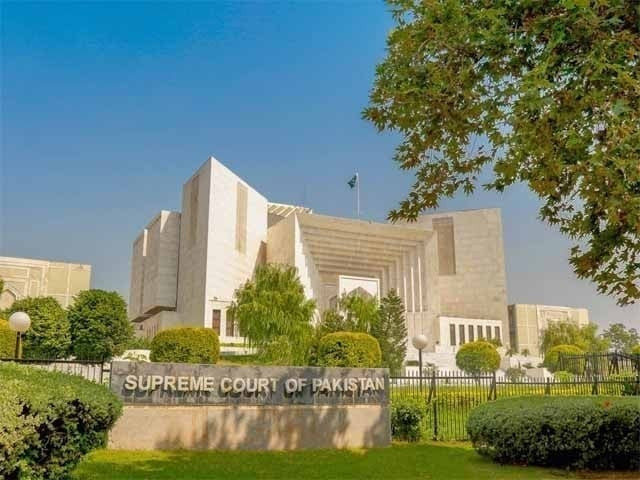ISLAMABAD:
The recently concluded general elections have once again brought the role of the Supreme Court, under the leadership of Chief Justice Qazi Faez Isa, into the spotlight, mirroring the controversies of the 2018 elections.
Despite expressing its grievances with other state institutions on various occasions, the Pakistan Tehreek-e-Insaf (PTI) was unable to catch a break from the CJP under whom the top court could not grant relief to the embattled former ruling party.
Although the court played its part in ensuring elections on February 8 on the demands of parties, including the PTI, lingering doubts emerged about the credibility of the entire electoral performance.
The situation has cast the country back to a scenario witnessed in 2018 when the leadership of the Pakistan Muslim League-Nawaz (PML-N) found itself behind bars just two weeks before the polls.
The role of former CJP Mian Saqib Nisar in those elections was also met with scepticism.
During that time, a three-judge bench led by ex-CJP Saqib Nisar had declared Imran Khan as “Sadiq and Ameen” (truthful and trustworthy). However, simultaneously, the SC ensured the conviction of former prime minister Nawaz Sharif and his daughter Maryam Nawaz before the elections.
In the lead-up to the 2024 general elections, a larger bench, presided over by CJP Isa, revisited its earlier decision on the disqualification of lawmakers under Article 62 (1) (f) of the Constitution. The ruling notably benefited PML-N supremo Nawaz Sharif and Jahangir Khan Tareen.
However, a different bench led by Chief Justice Isa deemed the intra-party elections of PTI illegal, leading to the party’s loss of its election symbol just before the polls. The credibility of the elections came into question following the order on January 13
‘Symbol case crumbles’
According to former additional attorney general Tariq Mahmood Khokhar, the PTI election symbol case crumbled on Feb 8 thanks to the people’s verdict.
“It was an act of judicial raw power reminiscent of Muhammad Munir, Sheikh Anwaarul Haq and Irshad Hassan Khan. In the words of U.S Justice Antonin Scalia it constitutes “… an affront to the principle of democratic rule… robs the People of the most important liberty: the freedom to govern themselves,” he noted.
He pointed out that consequences include marred elections, an assault on democracy, constitutional ambivalence, a deeply fractured nation and loss of public legitimacy in constitutional institutions.
“There cannot be many who fail to grasp the cause and effects,” Tariq Khokhar added.
Shahbaz Khosa, the Additional Secretary of the Supreme Court Bar Association (SCBA), also voiced dissatisfaction with the SC’s involvement in the recent general elections, highlighting the deprivation of the PTI from its election symbol.
He also criticised the conduct of the SCBA over the past couple of years, asserting that both superior bars are safeguarding the interests of powerful circles.
Legal experts argue that the SC now possesses a golden opportunity to rectify its previous mistake by safeguarding the mandate of a political party.
The focus of the discussion has shifted to whether the judiciary will offer relief to the PTI in election disputes, although election issues can only be contested in the election tribunals as per Article 225 of the Constitution.
Several candidates supported by PTI have lodged appeals with the higher courts contesting the election outcomes declared by Returning Officers (ROs).
It is pertinent to note that the strained relationship between PTI and the apex court intensified after the court deemed intra-party elections as illegal.
PTI also withdrew a contempt petition against the Election Commission of Pakistan (ECP) and other entities, citing a lack of confidence in obtaining relief during the elections.
An important aspect revolves around the allocation of reserved seats to PTI. The majority of lawyers believe that PTI should be granted reserved seats, and questions arise about whether PTI-backed independent candidates can form a parliamentary party.
A PTI lawyer disclosed that various options are under consideration to secure reserved seats. The decision on whether PTI will approach the SC to obtain reserved seats and bind their independent candidates from defection is still pending.
With the invalidation of intra-party elections, the question arises: who will assume the role of the party head and provide guidance on the applicability of Article 63-A of the constitution?
A senior government official emphasised the need for clarity on the interpretation of Article 63-A to deter the defection of independent candidates who were backed by the PTI.
Article 63 A (2) of the Constitution says that a member of a house shall be deemed to be a member of a parliamentary party if he has been elected as a candidate or nominee of a political party which constitutes the parliamentary party in the house or, having been elected otherwise than as a candidate or nominee of a political party has become a member of such parliamentary party after such election by means of a declaration in writing.
In view of this provision, there is a need to get clarification about the party ‘nominee’ and candidate’.
Lawyers believe that awarding three convictions to Imran Khan sent the wrong message to the public.
Despite these hurdles, the public voted for PTI-backed candidates.
A political leader not affiliated with PTI suggested that female voters were displeased with the Iddat case decision and mostly voted for PTI-backed candidates.
This situation also poses a test for the Supreme Court, examining how it will restore public faith in the judicial system.


